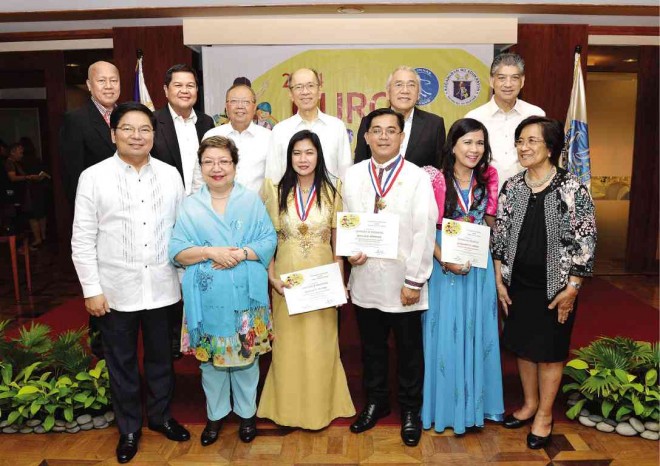Teachers of ‘hope’ honored

FRONT ROW, from left: Tetangco, Pantoja, Alvizo, Bambico, Abrigo and Hidalgo; back row: BSP deputy governors Vicente Aquino and Nestor Espenilla Jr., Monetary Board members Juan de Zuñiga Jr., Armando Suratos, Alfredo Antonio and Valentin Araneta
A Home Economics and Livelihood (Edukasyong Pantahanan at Pangkabuhayan or EPP) teacher became the first man to be named national winner of the Guro ng Pag-asa Award, a joint initiative of the Department of Education (DepEd) and Bangko Sentral ng Pilipinas (BSP).
Aside from Danilo B. Bambico of the Baguio City Special Education (SPED) Center in Baguio City, other 2014 Guro ng Pag-asa national winners were Values Education (Edukasyon sa Pagpapakatao or EsP) teacher Angelie C. Alvizo of Butuan City SPED Center and Social Studies (Araling Panlipunan or AP) teacher Juana Nimfa P. Abrigo of Alaminos Elementary School, Laguna.
The awardees received P100,000 in cash and a specially designed medallion each.
Their schools each received brand-new computer packages with printer, projector and screen.
The three-year-old annual Guro ng Pag-asa (Gantimpala para sa Ulirang Pagtuturo ng Pag-iimpok at Araling Pansalapi) awards program honors the best in teaching and integrating lessons on saving, money management and entrepreneurship in the elementary curriculum through three entry subjects—EsP, AP and EPP.
Article continues after this advertisementThis year’s winners were cited not just for “exemplary performance” in teaching financial lessons to students but also for “exceptional dedication” to bring financial literacy to their respective communities.
Article continues after this advertisementAlso presented during the ceremonies at the Bangko Sentral was a new award for the best sustained savings and entrepreneurship program by a teacher, student, class or school. The Bida sa Pag-iimpok at Pangkabuhayan will be known as the BSP Award.
First recipient of the BSP Award was Rexza Mae C. Panaligan, a Grade 5 student of Santa Barbara Central Elementary School in Iloilo, for her peer tutoring program that promoted financial skills and demonstrated to other children resourcefulness in managing finances.
Although Home Economics is traditionally associated with lessons on homemaking and housekeeping, Bambico focused on livelihood, particularly entrepreneurship.
As the judges noted, Bambico did not only integrate financial literacy in class lessons but he gave his students opportunities to apply what they learned outside the classroom—getting summer jobs, undertaking small enterprises like craft-making, etc.
Bambico said, as one of 13 children, he knew from personal experience entrepreneurship could work, as it enabled him to augment the family income and pursue his studies.
He even helped his own school raise money for its library through Basura para sa Aklatan (Trash for the Library). His students, their parents and school officials recycled and sold trash for cash.
Alvizo’s creative way of weaving financial lessons in her classes impressed the judges. Through various activities, her classes became interesting and fun and made it easy for students to learn lessons on saving.
Alvizo said she became an advocate of saving after she and her husband suffered a financial crisis. She said she encouraged her pupils and her children to save a little amount from their daily pocket money and taught ways to earn, like holding garage sales.
Abrigo spread the “gospel” of saving not just among her students but also colleagues and parents. The judges said she talked about financial education during Parent-Teacher Association meetings and taught her pupils to develop their own versions of the lessons that they could effectively apply in their lives.
Abrigo said educators played an important role in the education of children not just academically, but also in their values. Teachers, she said, should teach students the value of money, regardless of amount, and to save to counter consumerism and discourage dependency.
In his opening remarks, BSP Governor Amando M. Tetangco Jr. said the awards program was important because through the teachers “we reach out to over 13 million public elementary students who are taught basic lessons on saving, money management and entrepreneurship.”
The national winners, he said, showed “creativity, passion and dedication in instilling among their students the habit of saving, prudent spending and how to earn and grow their money.”
Tetangco said the awardees “are not only good educators, they also provide inspiration and motivation for their students to take action on what they have learned.”
The teachers and the BSP student winner found new ways to cultivate the habit of saving and wise spending, and creative ways of growing money and being part of a community of savers, he said.
Perfect platform
Education Secretary Armin Luistro, in his closing remarks read by Maria Lourdes Pantoja of the National Educators Academy of the Philippines, said the K to 12 (Kindergarten to Grade 12) basic education program “is the perfect platform to leapfrog the value of financial awareness and wise spending early on in the lives of our students.”
He said the new program’s senior high school accountancy, business and management strands also highlighted economics and actuarial mathematics as branches of study essential to nation-building.
Luistro said the Filipino learner remained intelligent, well-rounded and globally-competitive. The wisdom of teachers tapped and maximized the potentials of students.
“This award (Guro ng Pag-asa) represents the victories of all our teachers as they stand up for education and hone the analytical minds of the country’s learners,” the secretary said.
The contest’s board of judges was composed of former DepEd officer in charge Dr. Fe A. Hidalgo, Dr. Wilma S. Reyes of Philippine Normal University and Bureau of Elementary Education director Dr. Marilette R. Almayda.